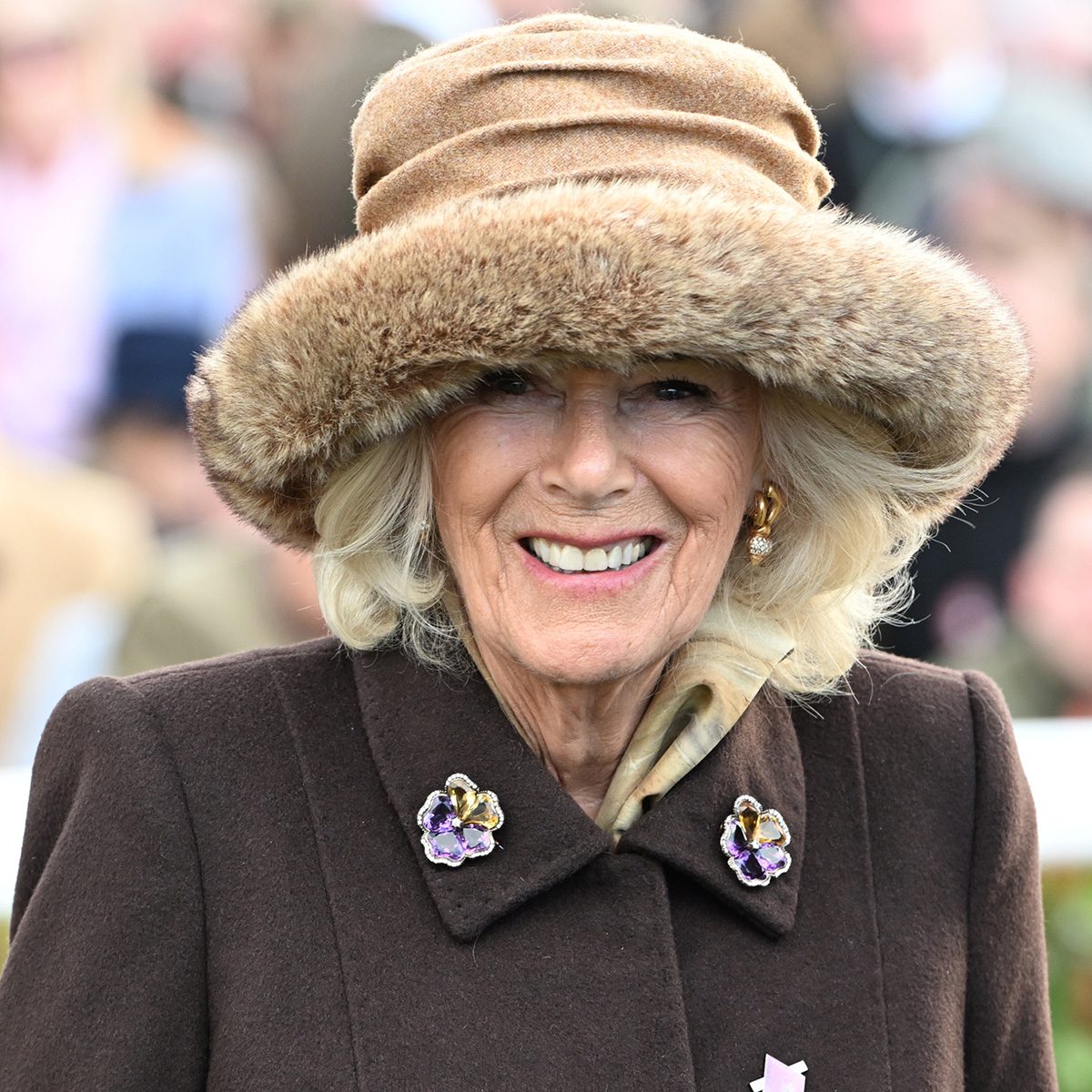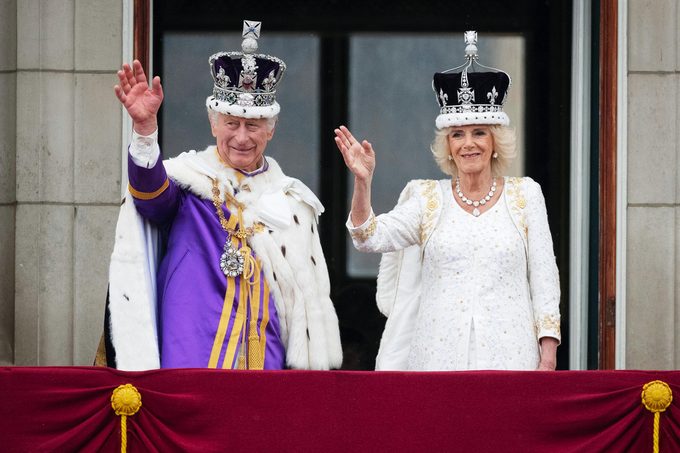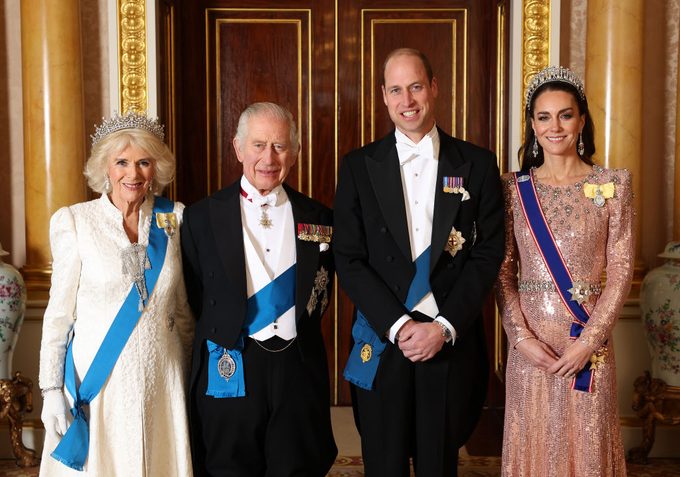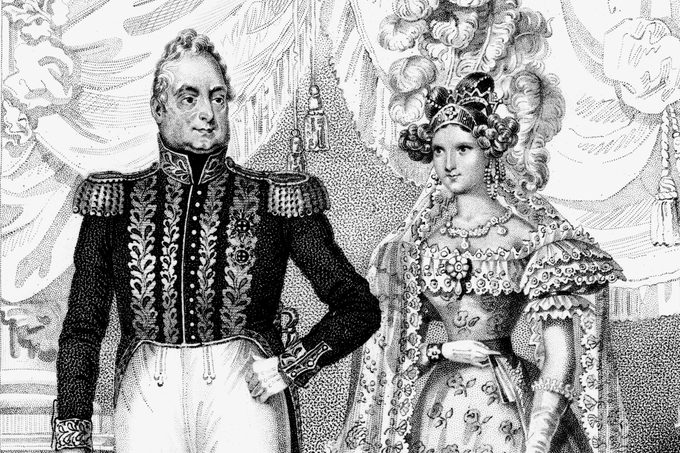Royal rules dictate what Camilla’s title is now, what it could be in the future and whether she could ever rule as Britain’s monarch

What Is Camilla’s Title—And Could She Rule England One Day?

Marrying into the British royal family comes with many privileges—and also many rules. Those rules regulate not only numerous scenarios in daily life but also what could happen if there’s a death. When Camilla Parker Bowles and then–Prince Charles tied the knot in 2005, she was given the title Duchess of Cornwall. That title changed, however, when Queen Elizabeth II died and Charles became king … and it could change again if Camilla outlives her husband. So what is Camilla’s title now, and could she ever be England’s reigning monarch? That “what if” scenario has been pondered in greater detail recently, in light of both King Charles’s cancer diagnosis and the simple fact that he’s in his mid-70s.
“It’s tricky because her title doesn’t just represent her role,” says Carolyn Harris, PhD, a historian and the author of Queenship and Revolution in Early Modern Europe. “It changes in relation to who is ruling at the time.”
But how, exactly? Reader’s Digest interviewed Harris, royal expert Marlene Koenig, author of Queen Victoria’s Descendants, and British historian Nicoletta Gullace, PhD, an associate history professor at the University of New Hampshire, to get to the bottom of this. Read on to find out all about Camilla’s title and what could happen to it—and her royal responsibilities—in the event of King Charles’s death.
Get Reader’s Digest’s Read Up newsletter for more royals, entertainment, humor, travel, tech and fun facts all week long.
What is Camilla’s title now?

“Camilla Parker Bowles’s title is now Her Majesty the Queen,” Harris says. At King Charles’s coronation in May 2023, Camilla officially became Queen Camilla. This was a change from her original title as queen consort, which she had received when Queen Elizabeth died. Interestingly, the palace didn’t make a public announcement that her title was changing again; the word consort was simply dropped on the coronation invitation.
According to the BBC, queen consort had initially been used to distinguish Camilla from Elizabeth II, and the coronation seemed like an “appropriate time” to make Camilla queen. It might have helped, too, that Camilla’s popularity ratings in the U.K. significantly increased in the months leading up to the coronation.
What’s the difference between a queen and a queen consort?
It comes down to power and how they got the job, Harris says. Here’s the difference:
- A queen regnant (usually simply called “queen”) is a ruling monarch who inherits the throne and reigns in her own right—like Queen Elizabeth II or Queen Victoria. She has full sovereign powers, just like a king would.
- A queen consort is the wife of a reigning king. She holds the title of queen but does not have any official ruling power or political authority. Her role is primarily ceremonial and supportive, focused on royal duties, charity work and public engagements.
So which kind of queen is Camilla now? When Charles decided she would simply be known as Queen Camilla, he dropped the consort for simplicity—but her status as a non-reigning queen remains unchanged. She may also be referred to as Her Majesty the Queen or Her Majesty Queen Camilla, but not as Her Royal Highness.
It’s not just about keeping things simple, though—Camilla becoming queen instead of queen consort actually carries a significant meaning. For years, people debated whether she should even get the title at all. After all, to many Brits, she was the other woman—the one Charles had an affair with while still married to Princess Diana. The idea of her sitting beside Charles as the queen didn’t sit well with them. But over time, Camilla slowly won over the public. Her dedication to charity work and her unwavering support of Charles helped shift perceptions. And in the end, it was Queen Elizabeth herself who settled the debate. In 2022, just months before her passing, she publicly stated it was her “sincere wish” that Camilla would take on the title of queen consort when Charles became king. So when he quietly dropped consort, most people didn’t bat an eye.
From a constitutional standpoint, Harris says that nothing really changed—Camilla doesn’t have ruling power, and her role remains purely ceremonial. But dropping consort from her title does break with tradition and reinforces the idea that a king’s wife is always queen, no matter what the history books say. More than anything, this shows that the monarchy is capable of evolving, proving once again that public opinion and royal tradition are in a never-ending dance to keep the institution relevant in today’s world.
How would Camilla’s title change if King Charles dies?
Camilla’s title is not guaranteed for life, since she is a royal by marriage, not birth. This means it will be up to the new king, Charles’s son William, to decide what she’d then go by. “While the ultimate decision would be in William’s discretion, she would probably become queen dowager, which basically means ‘widow of the king,'” explains Gullace.
Her full official title will likely be Her Majesty the Queen Dowager, though she will probably continue to go by Queen Camilla and Her Majesty in daily life. “Camilla would always be a queen, just not ‘the’ queen,” Koenig explains. “That would be Catherine, as William’s wife.”
But the title queen mother—as in the case of Queen Elizabeth II’s mother—can pretty much be ruled out, given that Camilla is not the birth mother of William.
Would Camilla become the ruling British monarch?

No, Camilla will never be the ruling British monarch. The line of succession is regulated both through descent and parliamentary statute. The latter is based on the Bill of Rights (1689) and the Act of Settlement (1701), and it prohibits anyone not born into the British royal family from becoming sovereign.
So, while consort might have been dropped from Camilla’s title in 2023, this did not make her a reigning queen. In reality, this title didn’t give Camilla any more (or less) power than she already had before—she is still simply the wife of the reigning sovereign. She supports him and undertakes official engagements, but she does not share his position as the head of state or the Commonwealth and she could never succeed him as ruler if he dies first.
According to the official line of succession, the next sovereign will be Prince William. “The minute his father dies, William is king,” Gullace says. “This is something that happens automatically.”
How would Camilla’s duties change as queen dowager?
Despite the likely title change, Camilla’s duties and official engagements would probably more or less stay the same. Right now, Camilla is patron or president of more than 90 charities, including for health and well-being, survivors of rape and sexual assault, and the arts. And while she could slightly cut down on official royal engagements, none of the royal experts we interviewed believe she’d completely retire from them if Charles passed.
“She has really settled in and has become a valuable and well-respected asset to the royal family, which is remarkable, considering she came in only later in life,” Koenig says. “I’m sure she would continue her charity work even as queen dowager, knowing that the charities count on her.” Koenig adds that William and Kate would probably be grateful for the extra help, considering the ever-decreasing number of working senior royals after Harry and Meghan quit the Firm and Prince Andrew had to step back.
When did England last have a queen dowager?

Nearly two centuries ago! Queen Adelaide, the last British royal to hold this title officially, became queen dowager when her husband, King William IV, died in 1837. Adelaide lived for another 12 years, and since the pair didn’t have any children, William’s niece Queen Victoria inherited the throne. While little is known about the public engagements Adelaide undertook as queen dowager, she made a name for herself by donating generously to charities—a move that was greatly appreciated by the public.
Technically, Queen Elizabeth II’s late mother—Queen Elizabeth, wife of George VI—would have been the most recent queen dowager. However, when her husband died in 1952, she opted for the title queen mother rather than queen dowager, probably for practical reasons. “Imagine the confusion if there had been two Queen Elizabeths,” Koenig says. “I think if she’d had another name, she wouldn’t have done it, but in this case, it was just easier to officially go by queen mother. So while the titles might be different, Camilla’s position would be the exact same as the queen mother’s.”
Just like King Charles’s wife, the queen mother loved her charity work and was patron or president of many organizations—350, to be precise! She continued her engagements and involvement in public life up until a few months before her death at 101, in 2002.
About the experts
|
Why trust us
Reader’s Digest has published hundreds of stories on the British royal family, providing a behind-the-scenes look at the fascinating facets of the monarchy. We regularly cover topics including the latest royal news, the history and meaning behind time-honored traditions, and the everyday quirks of everyone’s favorite family members, from Queen Elizabeth’s daily snack to Prince William’s confessions about his home life. We’re committed to producing high-quality content by writers with expertise and experience in their field in consultation with relevant, qualified experts. We rely on reputable primary sources, including government and professional organizations and academic institutions as well as our writers’ personal experiences where appropriate. For this piece on Camilla’s title, Astrid Hofer tapped her experience as a London-based journalist with more than 20 years of experience covering topics including the British royal family. We verify all facts and data, back them with credible sourcing and revisit them over time to ensure they remain accurate and up to date. Read more about our team, our contributors and our editorial policies.
Sources:
- Carolyn Harris, PhD, historian and professor of history at the University of Toronto School of Continuing Studies; email interview, March 13, 2025
- Nicoletta Gullace, PhD, British historian and associate professor of history at the University of New Hampshire; Zoom interview, Feb. 8, 2024
- Marlene Koenig, royal expert and author of Queen Victoria’s Descendants; Zoom interview, Feb. 9, 2024
- Royal.uk: “The Queen”
- Royal.uk: “Succession”
- BBC: “Queen backs Camilla to be Queen Consort on Jubilee”
- AP News: “Queen or queen consort? What to know about Camilla’s title”
- Town & Country: “Queen Camilla’s title will be ‘Queen Dowager’ if she outlives King Charles”























